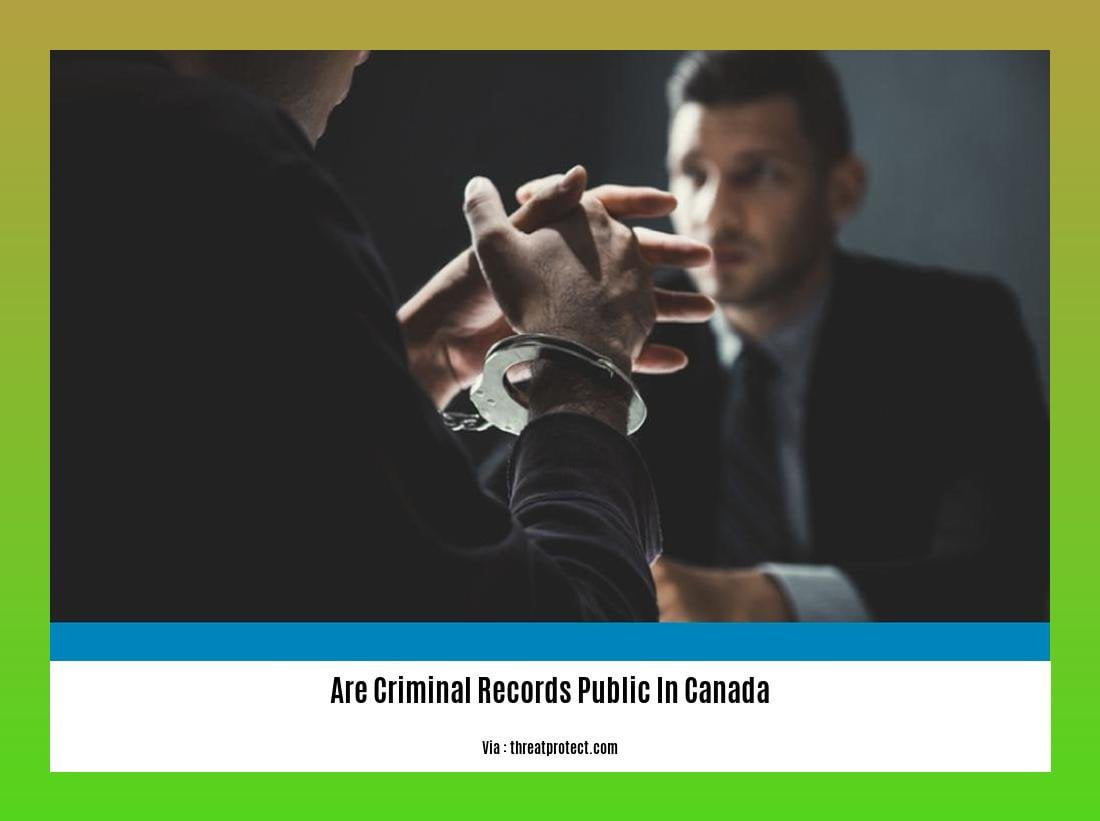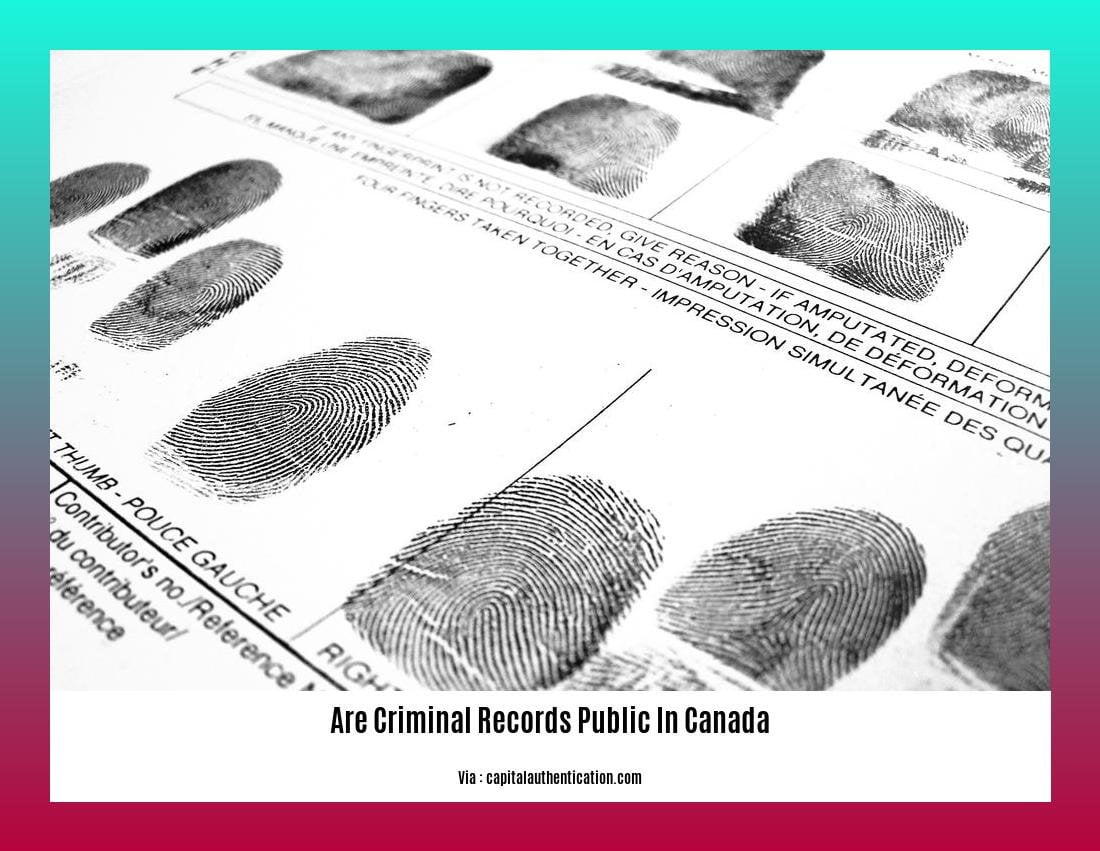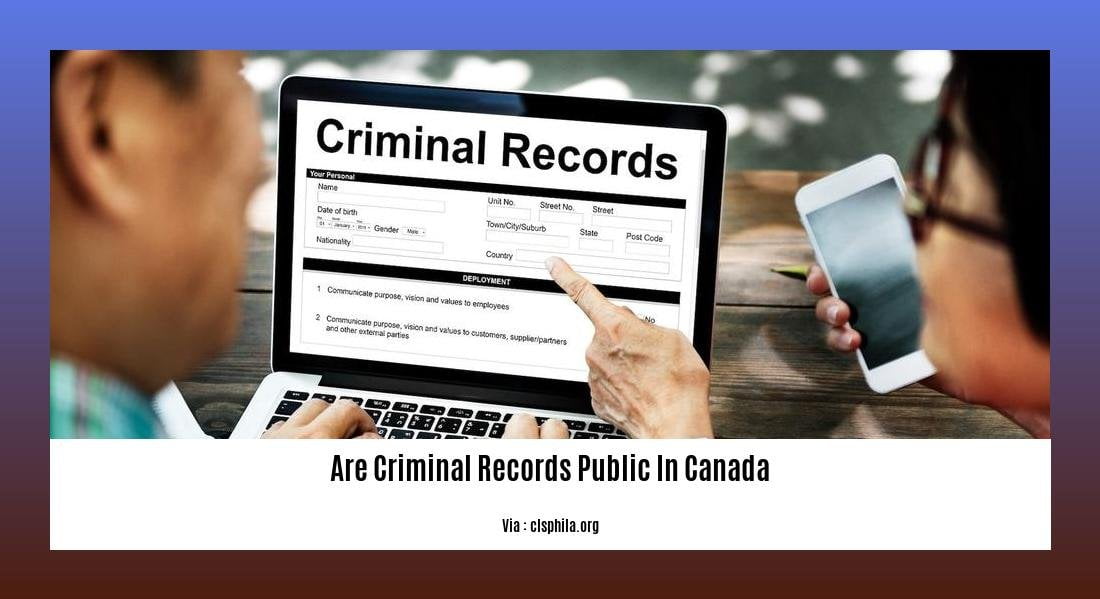Are Criminal Records Public in Canada? Exploring the Accessibility and Transparency of Canadian Criminal Records
As concerns about crime and safety continue to dominate public discourse, it becomes increasingly important to understand the accessibility and transparency of criminal records in Canada. In this article, we delve into the intricate world of Canadian criminal records, aiming to shed light on the burning question: are criminal records public in Canada? Drawing on extensive research and legal expertise, we will explore the various factors that influence the availability of criminal records to the public, providing valuable insights into this crucial aspect of the Canadian criminal justice system.
Key Takeaways:
- Court Services Online (CSO) provides access to public court records, including Provincial Court ticket records and Provincial Court criminal records.
- The Royal Canadian Mounted Police (RCMP) maintains a database containing details of every criminal offence in Canada, regardless of the court outcome.
- The RCMP’s Canadian Criminal Real Time Identification Services (CCRTIS) maintains the national database of criminal records in Canada.
- Local police and other authorities across Canada contact CCRTIS to check the fingerprint records of individuals.
- The Ontario Court of Justice allows public access to court proceedings, court records, and digital audio recordings, upholding the open court principle.
- Criminal records in Canada are generally not public, with exceptions related to laws regulating firearms and protecting children.
- Access to criminal records in Ontario is regulated by the Police Record Checks Reform Act.
- Convictions will appear on background checks, and obtaining a Pardon, known as a Record Suspension, is the only way to remove a conviction.
- Once a process is issued, criminal court files and documents are publicly accessible, unless restricted by legislation, common law rules, or court orders.
- Court staff cannot provide official criminal record checks; only police services can undertake an official criminal record check for employment or related purposes.
Are Criminal Records Public in Canada?

Criminal records are a crucial component of the Canadian justice system. They serve as a record of an individual’s criminal history and can have significant implications on various aspects of their lives, including employment opportunities and personal relationships. But are criminal records public in Canada? Let’s explore the accessibility and transparency of Canadian criminal records.
Access to Court Records and Digital Audio Recordings
In Canada, court proceedings are generally open to the public, highlighting the importance of the open court principle. This means that court records and digital audio recordings of court proceedings are accessible to the public, allowing for transparency and accountability.
Court Services Online and Criminal Records
One avenue through which the public can access certain criminal records in Canada is through Court Services Online (CSO). CSO provides access to public court records, including Provincial Court ticket records and Provincial Court criminal records. However, it’s important to note that most of the records displayed on CSO pertain to traffic offences or criminal code offences.
The RCMP and the National Database of Criminal Records
The Royal Canadian Mounted Police (RCMP) maintains a comprehensive database containing details of every criminal offence in Canada, regardless of the court outcome. This national database, known as the Canadian Criminal Real Time Identification Services (CCRTIS), serves as a valuable resource for law enforcement agencies and authorities across the country.
Local police and other authorities often contact CCRTIS to perform fingerprint checks and access the criminal records of individuals. This ensures that crucial information is readily available to aid in legal proceedings and law enforcement efforts.
Access to Criminal Records in Ontario
In Ontario, the Police Record Checks Reform Act governs access to criminal records. This legislation strikes a balance between privacy rights and the need for public safety. It outlines the rules and procedures for conducting criminal record checks for employment or related purposes.
Exceptions and Restrictions
While court proceedings and certain criminal records are accessible to the public, it’s essential to recognize that criminal records in Canada, in general, are not considered public information. There are exceptions to this rule, particularly when it comes to laws regulating firearms and protecting children.
Additionally, it’s worth noting that once a criminal court process is initiated, court files and documents related to the case become publicly accessible unless restricted by legislation, common law rules, or court orders.
Criminal Records and Background Checks
Convictions can appear on background checks, which may impact an individual’s prospects for employment and other opportunities. However, it’s important to remember that obtaining a Pardon, also known as a Record Suspension, can remove a conviction from an individual’s criminal record. This provides an opportunity for rehabilitation and a fresh start.
Obtaining Official Criminal Record Checks
It’s important to mention that court staff cannot provide official criminal record checks. Only authorized police services can undertake an official criminal record check for employment or related purposes. This helps ensure the accuracy and reliability of the information provided.
In summary, criminal records in Canada are not public in nature, with exceptions related to laws governing firearms and protecting children. Access to court proceedings, court records, and digital audio recordings aligns with the open court principle, promoting transparency within the justice system. Understanding the accessibility and privacy frameworks surrounding criminal records is vital for individuals and institutions alike, contributing to a fair and accountable criminal justice system.
Antonio Valencia is not only an exceptional football player, but his PES (Pro Evolution Soccer) stats are also truly remarkable. If you want to find out more about Antonio Valencia’s PES stats, click here.
If you’ve ever wondered whether juice cleanses are high in sugar, we have the answer for you. Discover the truth about juice cleanses and their sugar content by clicking here.
Are you a spouse of a veteran? It’s important to know if you’re eligible for benefits. Find out all the information you need about eligibility for veteran spouse benefits by clicking here.
Accessing Criminal Records in Canada: Public vs. Restricted Information
In Canada, accessing criminal records is a topic that raises questions about the availability of such information to the general public. To truly understand the accessibility and transparency of Canadian criminal records, it is crucial to examine the relevant laws and regulations. Let’s delve into this subject and explore the key factors that determine whether criminal records are public or restricted in Canada.
The Police Record Checks Reform Act: Regulating Access to Criminal Records in Ontario
In Ontario, the access to criminal records is governed by the Police Record Checks Reform Act. This legislation aims to strike a balance between privacy rights and public safety concerns. Under this act, access to criminal records is generally restricted, except when written consent is provided by the person involved or in specific circumstances as defined by the law.
Understanding the Jurisdiction of Criminal Records in Canada
Criminal records in Canada are managed by various jurisdictions, including federal, provincial, and municipal entities such as the police and courts. The Royal Canadian Mounted Police (RCMP) maintains a National Repository of Criminal Records; however, it does not include all criminal record information. It is important to note that criminal court files and documents are usually accessible to the public once the legal process is initiated, unless restricted by legislation, common law, or a court order.
Authorized Access to Canadian Criminal Records
While criminal records are generally not considered public information, there are authorized persons and entities that can access them for legitimate purposes. These include border security officers, judges, police officers, and businesses that require background checks for employment or licensing purposes. They can access the RCMP criminal records database to obtain the necessary information. Additionally, fingerprints taken during the arrest and charging process are stored in a database, allowing authorized individuals to verify an individual’s criminal record.
Exceptions to Restricted Access Laws in Canada
It is worth highlighting that there are exceptions to the general rule of restricted access to criminal records in Canada. Specifically, laws relating to firearms and child protection often require public disclosure of relevant criminal records. These exceptions are enacted to ensure public safety and the well-being of vulnerable individuals.
Key Takeaways:

- Criminal records in Canada are generally not public, with restricted access being the norm.
- Ontario’s Police Record Checks Reform Act regulates access to criminal records, requiring written consent except in specific circumstances.
- Criminal records in Canada are maintained by federal, provincial, and municipal jurisdictions, such as the police and courts.
- The RCMP manages a National Repository of Criminal Records, but it does not include all criminal record information.
- Authorized persons, such as border security officers, judges, police officers, and businesses, can access the RCMP criminal records database.
- Exceptions to restricted access laws include regulations pertaining to firearms and child protection.
- Criminal court files and documents are typically accessible to the public unless restricted by legislation, common law, or a court order.
Citation:
1. Criminal Records in Canada – 3 Things You Need To Know
2. What You Need to Know About Criminal Records in Canada
URL Sources:
– NextLaw – Criminal Records in Canada – 3 Things You Need To Know
– Masstsang – What You Need to Know About Criminal Records in Canada
The Process of Obtaining Criminal Record Information in Canada
Are you wondering about the accessibility and transparency of criminal records in Canada? In this article, we’ll explore the process of obtaining criminal record information in Canada, shedding light on the intricacies of this topic. Whether you’re conducting research, applying for a job, or simply curious, understanding the process can help you navigate through these records.
Regulating Accessibility
In Canada, criminal records are generally not public. However, there are exceptions to this rule. Certain laws related to firearms and protecting children allow limited public access to criminal records. It’s important to note that accessing specific criminal records varies across different jurisdictions within the country.
Ontario’s Police Record Checks Reform Act
In Ontario, the process of accessing criminal records is governed by the Police Record Checks Reform Act. This legislation strikes a balance between privacy rights and the need for public safety. Under this act, public access to criminal records is generally prohibited, unless written consent is provided by the individual whose record is being checked.
Decentralized Management
The management and storage of criminal records in Canada are decentralized, with responsibilities distributed among federal, provincial, and municipal jurisdictions. The Royal Canadian Mounted Police (RCMP) operates a National Repository of Criminal Records, but it’s important to note that this database does not contain all criminal record information. It primarily serves as a reference for authorized individuals rather than being accessible to the general public.
Background Checks and Convictions
Convictions can appear on a background check, potentially impacting employment prospects and other aspects of a person’s life. However, individuals have the option to apply for a Pardon, now known as a Record Suspension, to have a conviction removed from their criminal record. Keep in mind that if an individual was charged but not convicted, it can still show up on a background check.
Applying for a Criminal Record Check
To obtain a criminal record check, individuals can visit their local police service or an accredited fingerprint company. These authorized entities can provide official criminal record checks to ensure accuracy and reliability. By following the necessary procedures, you can gather the required information while maintaining the privacy and security of individuals’ personal data.
Expungement as a Remedy
Expungement in Canada is a course of action pursued to rectify unjust convictions from the past. It involves seeking the removal of a conviction from an individual’s criminal record. The expungement process can vary depending on the jurisdiction and the circumstances surrounding the conviction. Seeking legal advice is crucial when pursuing expungement, as it involves navigating complex legal procedures.
Addressing the Effects of a Criminal Record
Depending on the situation, there may be options available to address and mitigate the effects of a criminal record. It’s important to consult with legal professionals to explore alternative resolutions such as sealing or expungement of records, especially in cases where the charges have been withdrawn or an individual has been found not guilty.
Key Takeaways:
- Criminal records in Canada are generally not considered public information, with some exceptions related to firearms and child protection laws.
- The Police Record Checks Reform Act governs access to criminal records in Ontario, protecting privacy rights while prioritizing public safety.
- Criminal records in Canada are managed at federal, provincial, and municipal levels, with the RCMP operating a National Repository of Criminal Records that is accessible to authorized individuals.
- Convictions can appear on background checks, but individuals can pursue a Pardon or Record Suspension to have a conviction removed from their criminal record.
- To obtain a criminal record check, individuals can approach local police services or accredited fingerprint companies.
- Expungement is a possible remedy for unjust convictions, involving the removal of a conviction from an individual’s criminal record.
- Consultation with legal professionals is essential for addressing and mitigating the effects of a criminal record, exploring options such as sealing or expungement.
Sources:
1. NextLaw – Criminal Records in Canada – 3 Things You Need To Know
2. Public Safety Canada – Criminal Records
Implications and Considerations Regarding Public Accessibility of Criminal Records in Canada
Challenges in Accessing Criminal Records
Obtaining criminal records in Canada can be challenging for the general public. The management and storage of criminal records are decentralized, with federal, provincial, and municipal jurisdictions sharing the responsibility. The Royal Canadian Mounted Police (RCMP) manages the National Repository of Criminal Records; however, it does not include all criminal record information[^1^]. This limited accessibility poses implications for individuals seeking record suspensions and for the public attempting to access criminal records[^1^].
Legal and Charter Risks
Amendments made to the Criminal Records Act (CRA) in 2010 and 2012 have made obtaining record suspensions more difficult[^1^]. These changes have introduced legal and charter risks that create obstacles for individuals seeking record suspensions. The implications of these risks can affect an individual’s employment prospects, housing opportunities, and overall reintegration into society[^1^].
Limited Public Access and Privacy Measures
Court documents, including criminal records, are generally accessible to the public; however, certain restrictions are in place to protect privacy and maintain confidentiality[^2^]. The Supreme Court of Canada exerts its supervisory power over court records and may restrict access based on statutory provisions, common law rules, or court orders[^3^].
Access to the RCMP’s database of criminal records is not directly accessible to the general public[^2^]. Only authorized individuals, such as law enforcement personnel, have access to this database. This limited access ensures the privacy and security of sensitive criminal record information while still allowing the necessary authorities to utilize this data in the interest of public safety.
Importance of Future Research
Further research around the lifecycle of Canadian criminal records is crucial for the development of effective policies and practices[^4^]. Research scholars and experts are encouraged to delve deeper into this topic, both within Canada and internationally, to gain a comprehensive understanding of the implications of public access to criminal records[^4^]. This research can shed light on the impact of limited accessibility and contribute to the development of more efficient policies that balance public safety and individual privacy rights.
Key Takeaways:
- Obtaining criminal records in Canada can be challenging due to decentralized management and limited accessibility.
- Amendments to the Criminal Records Act have made it more difficult for individuals to obtain record suspensions, leading to legal and charter risks.
- Court documents, including criminal records, are generally accessible to the public, but restrictions exist to protect privacy and maintain confidentiality.
- The RCMP’s database of criminal records is not directly accessible to the public, ensuring the privacy and security of sensitive information.
- Future research is crucial to understand the implications of public access to criminal records and develop effective policies and practices.
Citation:
Citation:
FAQ
Q1: Are criminal records in Canada public?
A1: Generally, criminal records in Canada are not public, with exceptions related to laws regulating firearms and protecting children. Access to criminal records is covered by the Police Record Checks Reform Act in Ontario.
Q2: Who manages the national database of criminal records in Canada?
A2: The Royal Canadian Mounted Police (RCMP) maintains the national database of criminal records in Canada, which is called the Canadian Criminal Real Time Identification Services (CCRTIS).
Q3: Can the general public access the RCMP’s criminal records database?
A3: No, the RCMP’s criminal records database is not directly accessible to the general public. Only authorized individuals, such as law enforcement personnel, can access this database.
Q4: What is the process for obtaining a record suspension (pardon) in Canada?
A4: Obtaining a record suspension, also known as a pardon, in Canada can be challenging due to amendments made to the Criminal Records Act (CRA) in 2010 and 2012. These changes have created obstacles for individuals seeking record suspensions.
Q5: How can someone check their own criminal record in Canada?
A5: To check your own criminal record in Canada, you can visit your local police service or an accredited fingerprint company. Court staff cannot provide official criminal record checks; only police services can undertake an official criminal record check for employment or related purposes.
- Unlock Water’s Symbolism: A Cross-Cultural Exploration - April 20, 2025
- Identify Black and White Snakes: Venomous or Harmless? - April 20, 2025
- Unlocking Potential: Origins High School’s NYC Story - April 20, 2025















